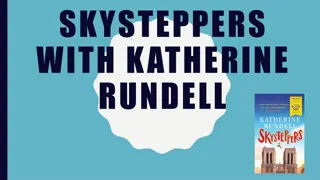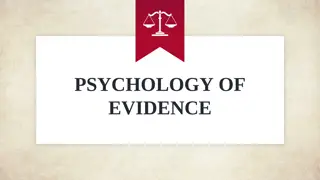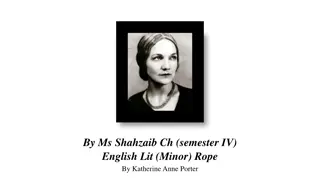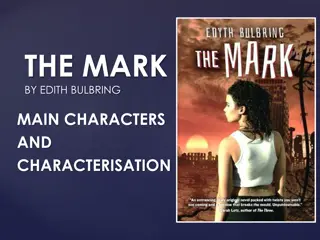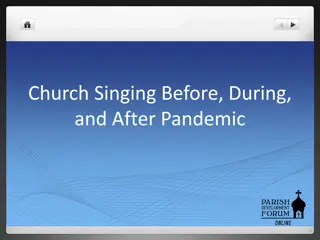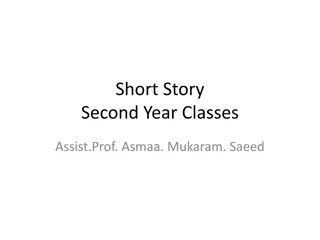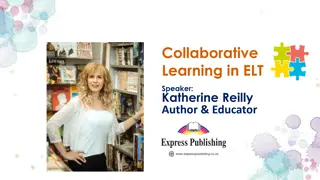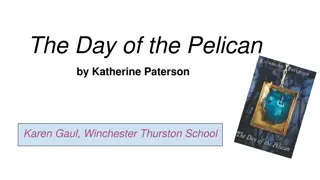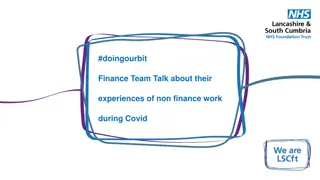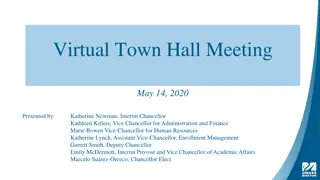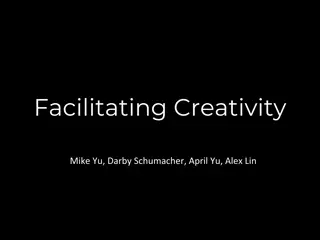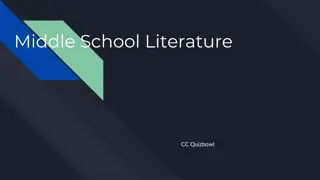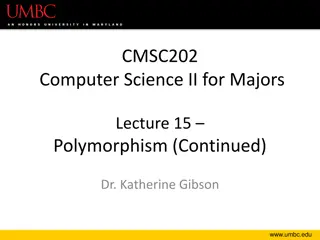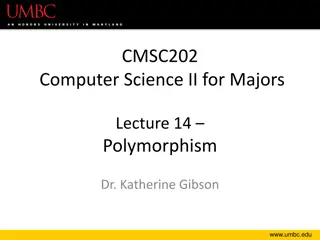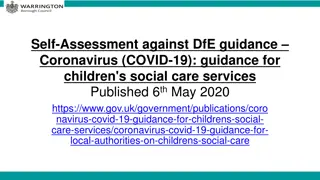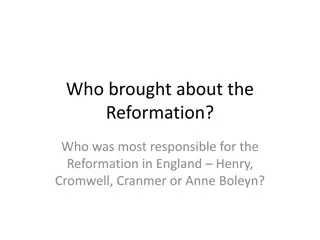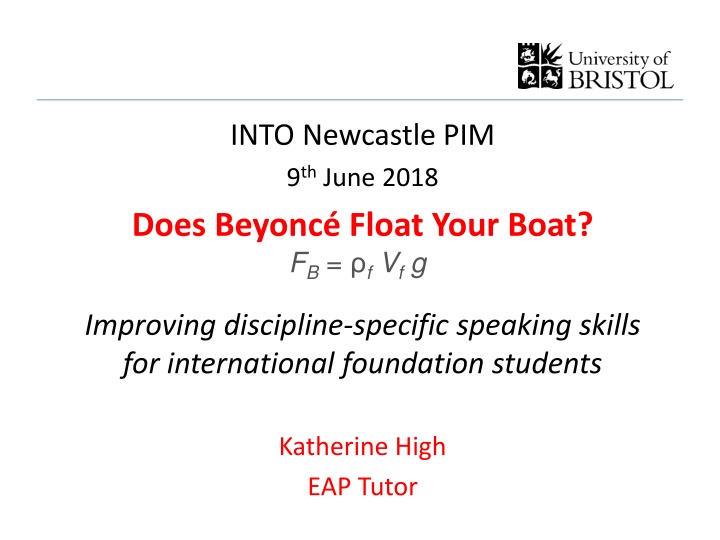
Enhancing Discipline-Specific Speaking Skills for International Foundation Students
Explore the innovative approach to improving discipline-specific speaking skills for international foundation students through a tailored course designed by EAP Tutor Katherine High. The course includes background and context, materials design, various speaking tasks, lecturer reflections, and course development insights. Discover how students engage with discipline-specific content, develop transferable speaking skills, and extend discussions beyond the classroom.
Download Presentation

Please find below an Image/Link to download the presentation.
The content on the website is provided AS IS for your information and personal use only. It may not be sold, licensed, or shared on other websites without obtaining consent from the author. If you encounter any issues during the download, it is possible that the publisher has removed the file from their server.
You are allowed to download the files provided on this website for personal or commercial use, subject to the condition that they are used lawfully. All files are the property of their respective owners.
The content on the website is provided AS IS for your information and personal use only. It may not be sold, licensed, or shared on other websites without obtaining consent from the author.
E N D
Presentation Transcript
INTO Newcastle PIM 9thJune 2018 Does Beyonc Float Your Boat? FB= fVfg Improving discipline-specific speaking skills for international foundation students Katherine High EAP Tutor
Outline Background and context Materials design Speaking tasks Evaluation: method & results Lecturer reflections Course development Q&A / Discussion
Background & Context IFP at Bristol pathways and course options BCH British Constitutional History 20 students 18 applied to do Law at UOB 13 received offers / 5 offered criminology 2 non-law: History / International Relations IELTS speaking level 5 to 8.5 Nationalities x 9
Materials Design Collaboration Timing: CEM (Sloan & Porter, 2010) Sample writing (Tribble & Wingate, 2013) Cases / Statutes Topics and reading materials Speaking task types Discipline-specific content Transferable speaking skills Homework tasks Negotiated Required
Speaking Tasks (1) Linked explicitly to the BCH assessment Presentations using the assessment criteria speed-dating for a scaffolded approach 3MT 3 minute thesis: technique and engagement Happy Human v. Boring Robot Speaking an essay fish-bone as a planning tool The hot-seat active listening, questioning, challenging
Speaking Tasks (2) Going beyond the BCH assessment Legal scenarios Jigsaw photo activities being specific, concise and precise critical response managing uncertainty Moot debates Discourse analysis: Brunel Moot Court finals (Basturkmen, 1999) Devil s advocate (Parrot & Cherry, 2011) Responding to others Interrupting and disagreeing Interpretation of legislation
Speaking Tasks (3) Extending discussion outside the classroom Padlet: https://en-gb.padlet.com/kh15349/gxit0szxpmxe Enabled quieter students to share their opinions / ideas Fluid genre like a blog post merging written and spoken discourse (Kuteeva, 2016) Served as a repository for revision Encouraged critical thinking challenging / questioning Preparation for the next link class ideas in mind
Evaluation: Method & Results Bristol Online Survey (BOS) Completed on phones in last lesson n=14 Confidence ranking questions: 0 not improved 3 really improved Learning outcomes measured EGAP ESAP being specific by referring to the relevant legal points in group discussions disagreeing and offering counter-arguments rebutting a counter-argument with legal points in group discussions presenting key points in a moot which are supported with legal evidence Responding to key points in a moot Rejecting the key points of others in a moot Responding to the Judge s questions in a moot
Results 14 12 10 8 6 4 2 0 GD being specific GD disagreeing GD rebutting M presenting supported points M responding M rejecting M Judge Questions not developed partly to some extent really improved
Results 6 further comments referred to the Moot Court: Moot is a good opportunity to practice speaking, especially when answering questions. If there are more presentations to practice, speaking will improve more . Moot court was really useful as I could increase my confidence in debating. Maybe, negotiating activities would also be interesting as they may relate to corporate law where negotiating and agreeing the best deal is important . The moot court was a great experience for the development of my speaking skills, especially because it was related to the activities that I am going to be doing next year. However, I do think that being in a place which resembled more a tribunal would ve enhanced my responsibilities and consequently my performance .
Lecturer Reflections on Speaking Skills Speaking Genre Skills Improved Skills to develop Much more specific referring to legal points Understanding roles of the government, parliament, The Crown and The Queen Presentations Use of correct legal terms Conclusions summarise and restate thesis rather than offer solution to a problem More participation overall Over reliance on proficient speakers who tend to dominate Seminars Need to understand that it's ok to be wrong Still confusion over the UK grammatically, geographically, legally More students made use of office hour in 2nd term Mainly less-proficient speakers coming in groups to ask about essay titles Tutorials
Lecturer Reflections on Speaking Skills Speaking Genre Skills Improved Skills to develop Attendance, confidence and participation Moots Terminology used well in arguments 2nd moot argued better against peers Verbally asserted their points in a timely and articulate manner Could hold their ground against the judge Those who attended were much more confident
Course Development More activities that encourage responding and rejecting More authentic moots student judges? ( t p nek, 2017) Use student samples from this year s summative assessment both written and spoken Simulate effective tutorials to promote dialogue with lecturer Use focus groups for student evaluation at different points in the academic year
Conclusion Speaking skills are transferable to other disciplines Discipline-specific content engages students more Value of multi-language level needs to be explicit to students Scaffolded approach boots confidence All speaking activities could be adapted for other EAP provision Tutor engagement in content can improve student engagement
References Basturkmen (1999) Discourse in MBA seminars: towards a description for pedagogical purposes. English for Specific Purposes, 18:1, 233-242 Kuteeva, M., (2016) Research Blogs, Wikis, and Tweets in Hyland, K., and Shaw, P., eds The Routledge Handbook of English for Academic Purposes. Routledge. Abingdon pp. 431-443 Parrot, H., & Cherry, E. (2011) Using structured reading groups to facilitate deep learning. Teaching Sociology 39:4 pp 354-370 Sloan, D., and Porter, E., (2010) Changing international student and business staff perceptions of in-sessional EAP: using the CEM model, Journal of English for Academic Purposes (9) pp. 198-210 t p nek, L. (2017) Creative EAP [Online] Available at: https://www.youtube.com/watch?v=Wd0JqyuE5pc [Accessed 30/06/17] Tribble, C. and Wingate, U. (2013) From text to corpus A genre-based approach to academic literacy instruction. System, 41(2), pp.307-321
Q&A / Discussion Any questions? What is your experience of developing speaking skills for ESAP?




